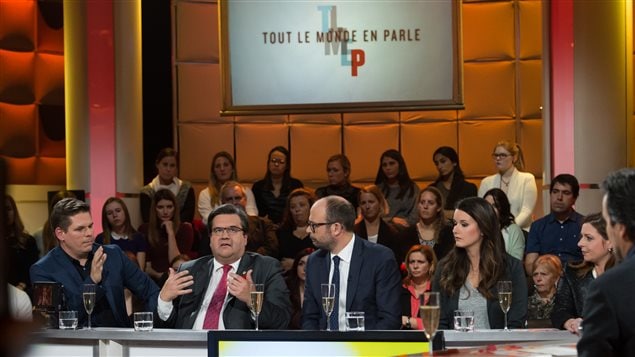Montreal Mayor Denis Coderre is denying allegations that he interfered in the decision by municipal police to launch a criminal investigation to find out who leaked police files to a well-known Quebec journalist.
In an interview Monday morning with a local radio station, Coderre admitted that he discussed the case of La Presse columnist Patrick Lagacé with then-city police chief Marc Parent in 2014. But Coderre denied he called for a criminal investigation into Lagacé’s police source.
Coderre said he called Parent in December of 2014 to complain about leaks to the media of his personal information. Coderre suspected leaks came from police files and made him feel that he was being spied on by disgruntled rank-and-file police officers locked in a bitter pensions dispute with the city.
Coderre said one of three leaks discussed with Parent involved a request by Lagacé seeking information about a traffic ticket received by the mayor two year earlier.
Doing journalistic legwork
Writing in Monday’s La Presse, Lagacé says he had contacted the mayor’s office to verify a tip received from a police source.
Lagacé wrote that he was looking into rumours that Coderre may have not paid a $444 ticket he got for an expired licence plate in 2012, while he was still a Liberal Member of Parliament. Lagacé had received electronic copies of Coderre’s ticket from a confidential police source.
After talking to several police sources, Lagacé says he determined the rumour was untrue and never wrote about it.
But Lagacé writes he later learned that shortly after his email to the mayor’s press secretary to find out what happened with that ticket, Montreal police opened a criminal investigation to find out who inside the police force had talked to him.
Intimidating sources
Lagacé writes that police never laid any charges against anyone and speculates that launching the criminal investigation, instead of an internal disciplinary inquiry, was a way of getting a legal reason to obtain warrants to spy on him.
By doing so Montreal police brass wanted to find out who inside the police department spoke to him, while at the same time intimidating his police sources, Lagacé wrote.
This is the second instance of police spying on Lagacé in a growing scandal that has forced the provincial government to call in a public inquiry into the issue of police surveillance of journalists.
The controversy began last week, when La Presse reported that Montreal municipal police had spied on Lagacé over a period of several weeks in 2016 to determine the identity of his police sources.
Quebec calls a public inquiry
According to the report, Montreal police had obtained at least 24 warrants to monitor all incoming and outgoing calls, texts and messages from Lagacé ‘s smartphone and had used the device’s GPS system to track his whereabouts.
Then Quebec provincial police revealed that they had kept tabs on six prominent investigative journalists in 2013 in order to fish out their sources for a report on a corruption scandal in the province’s construction industry.
That revelation forced Quebec Premier Philippe Couillard to upgrade a commission of inquiry, created to investigate the Montreal-Lagacé case, into a full-blown public inquiry with the power to call witnesses and hold public hearings.
La Presse has since reported that Montreal police did not only collect metadata from Lagacé’s phone but also obtained warrants to eavesdrop on his calls.
The outrage over police action in Quebec quickly reverberated not only in the province but also across Canada and internationally.
Prime Minister Justin Trudeau called reports about surveillance of journalists in Quebec “troubling” and said he received assurances from federal and national police and intelligence officials that no spying on journalists occurred on the federal level.







For reasons beyond our control, and for an undetermined period of time, our comment section is now closed. However, our social networks remain open to your contributions.